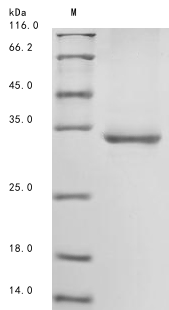The gene responsible for the Mouse Cd101 protein (22-266aa) is cloned into a plasmid vector to obtain recombinant plasmid, which is then transformed into baculovirus cells. baculovirus cells demonstrating successful uptake of the recombinant plasmid are selected based on their ability to endure a specific antibiotic. The baculovirus cells containing the recombinant plasmid are cultured under conditions promoting the expression of the gene of interest. The protein carries a N-terminal 10xHis tag. Post-expression, affinity purification is employed to isolate and purify the recombinant Mouse Cd101 protein from the cell lysate. The resulting recombinant protein is subjected to denaturing SDS-PAGE, allowing for an estimation of its purity, surpassing 85%.




